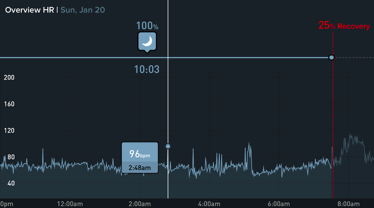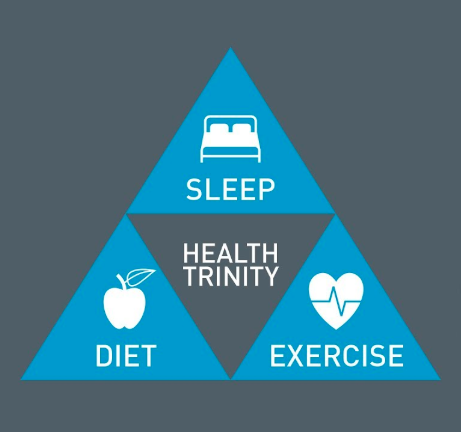Last Friday, Kelly posted an awesome article about how your sleep can impact your nutrition. Sleep is so important I ask every single patient about not just the quality of their sleep, but their daily sleep habits. Sleep (recovery) directly impacts your ability to rebuild and can reduce your injury risk.
With all the wearable technology that tracks your sleep for you, Let’s start with a better understanding of our sleep cycle.
Above is a picture of my sleep cycle from my WHOOP. (If you haven’t heard of WHOOP, it is a wearable strap that tracks not only your sleep, but your daily strain/load, and importantly a new concept called your heart rate variability (HRV), which has been shown to reliably predict injury (another post on this later).
Your sleep cycle has 4 stages (5 in some sources) and lasts on average about 90 minutes, with each stage having an important function in recovery.
Non-REM
Stage 1: the transition from wakefulness to sleep with a lowering of heart rate and body temperature.
Stage 2: also light sleep, but there is formation of sleep spindles which aide in muscle memory (CrossFit Journal)
Stage 3: Beginning of deep sleep. Important physiological processes happen in this phase.
-
Release of Human Growth Hormone (HGH) allowing your body to begin recovery and rebuilding processes from the day’s workout(s). You need HGH to build muscle with some sources citing up to 70% of your natural HGH released in this stage of sleep.
-
Conversely, Stage 3 suppresses cortisol, a hormone that acts to breakdown muscle.
-
Parasympathetic nervous system up-regulation which results in a cascade of hormonal changes that allow continued recovery and rebuilding processes.
-
Release prolactin to improve immune system function.
REM:
Stage 4: Rapid Eye Movement is the final stage of your cycle. As the name states, your eyes are moving rapidly from side to side, and your brain activity mimics wakefulness. Your muscles are largely paralyzed in this stage, for good reason, so you don’t act out your dreams and smack your sleeping partner next to you. REM sleep allows you to reset your brain to allow for improved memory retention.
Sleep and Injury
While the full underlying mechanism between sleep and injury risk is considered unknown, if we look at everything the sleep cycle allows us to do…
-
build muscle
-
improve muscle memory
-
suppress cortisol
-
improve immune system function
-
improve memory retention
-
perceived restfulness
…it’s not a big stretch to see how when we are performing highly skilled movements at high intensity how injuries can happen when we don’t allow these important processes to take place at night. One night of sleep loss in athletes resulted in less time to exhaustion and increased rating of perceived exertion. In high school athletes, those who reported less than 8 hours of sleep were 70% MORE LIKELY to report injury. In a study where researchers actively infected participants with the rhinovirus, those who slept 7 hours or less were THREE TIMES MORE LIKELY to develop an infection versus those that slept 8 or more. Sleep less than five hours a night and the likelihood of infection jumps 4.5 times.
This all makes good sense knowing the sleep cycle function now, but here’s the crazy part: Sleep deprivation can actual cause pain. In a 2012 study of over 12,000 women who at initiation of the study reported no musculoskeletal pain, physical impairments, or fibromyalgia, those who reported sleep problems often or always were 3.43 TIMES MORE LIKELY to develop fibromyalgia. This risk increases to 5.4 times for women over 45 years old. Furthermore in young, healthy adults 19-32, mild sleep deprivation resulted in increased spontaneous pain and increased sensitivity to heat and cold, which suggests an impact on the central modulation of pain.
Sleep is an important reset for all of your body systems. I hear it all day, “I only sleep 4 hours of night”. It’s said like a badge of honor in American society. However, only 5% of the population have the DEC2 gene that allows more efficient sleep around 5-6 hours. The rest of us, well we need our sleep.
Kelly provided awesome sleep hygiene tips so I’ll refer you back to that article here. If you’re not meeting the recommended 7-9 hours of sleep make it a goal to add 30-60 minutes of sleep every week to start paying off your sleep debt. You owe it to your body and your future goals.
Own your movement. Build your resilience. Warrior Rx.
Further Reading
Warrior Rx is Now Operating Out of Telos!
Sources
Simpson NS, Scott-Sutherland J, Gautam S, Sethna N, Haack M. Chronic exposure to insufficient sleep alters processes of pain habituation and sensitization. Pain. 2018;159(1):33-40. doi:10.1097/j.pain.0000000000001053.
Mork PJ, Nilsen TIL. Sleep problems and risk of fibromyalgia: Longitudinal data on an adult female population in Norway. Arthritis & Rheumatism. 2011;64(1):281-284. doi:10.1002/art.33346.
Brain Basics: Understanding Sleep. National Institute of Neurological Disorders and Stroke. https://www.ninds.nih.gov/Disorders/Patient-Caregiver-Education/Understanding-Sleep. Accessed February 3, 2019.
Watson AM. Sleep and Athletic Performance. Current Sports Medicine Reports. 2017;16(6):413-418. doi:10.1249/jsr.0000000000000418.
Rawls-Meehan M. Sleeping for Performance. The CrossFit Journal. June 2012.




Heello nice post